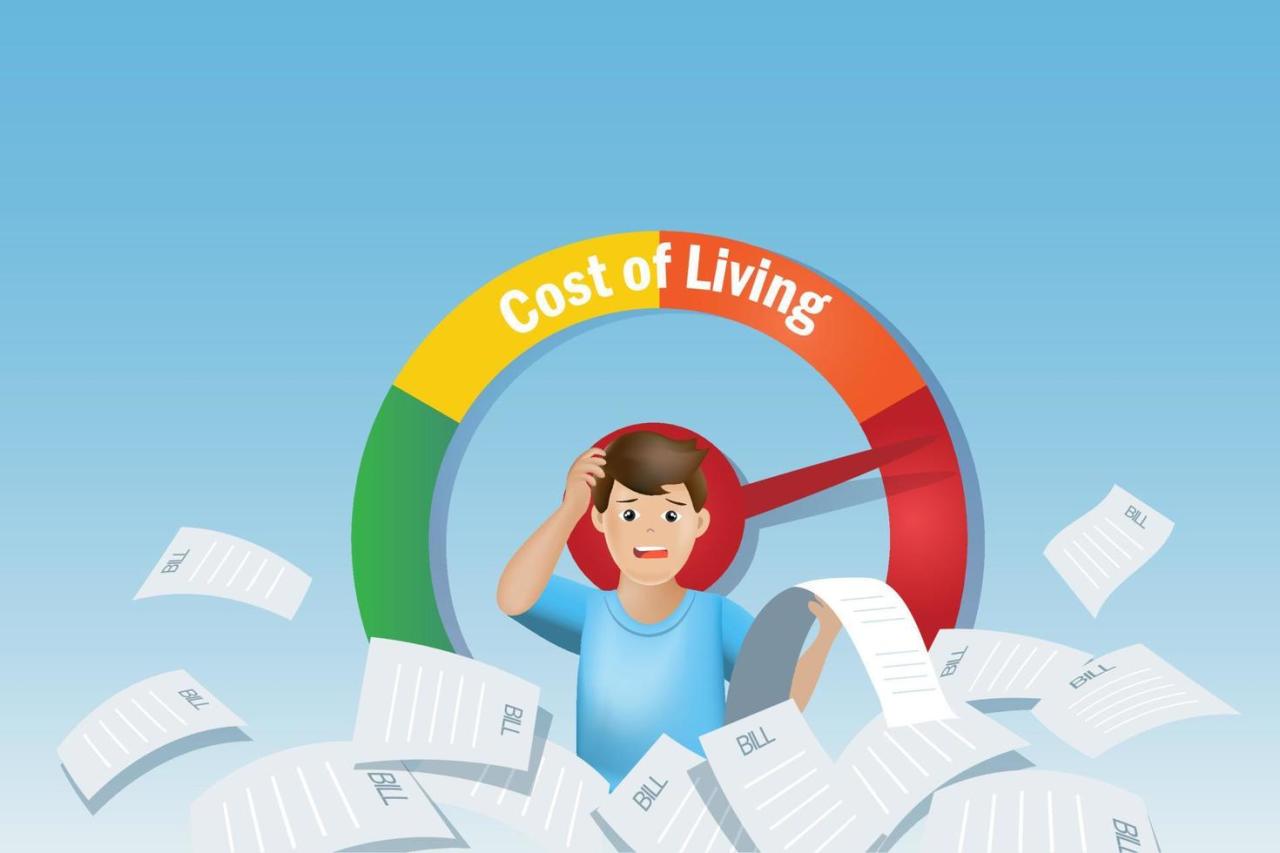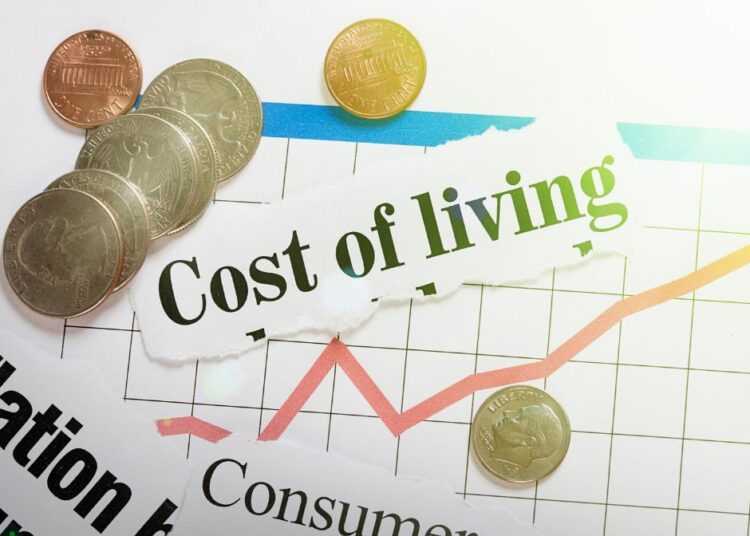In an era defined by persistent rising living costs, where inflation seems to relentlessly erode purchasing power, the challenge of maintaining financial stability has become a pressing concern for individuals and families worldwide. From soaring housing prices to escalating grocery bills and increasing utility costs, the squeeze on household budgets is palpable. However, succumbing to these pressures isn’t the only option. By implementing smart, proactive strategies, you can not only defy rising living costs but also fortify your financial resilience, ensuring your hard-earned money works harder for you. This comprehensive guide will delve deep into the core reasons behind increasing expenses, provide actionable tips for managing and reducing them, and offer long-term solutions to build a robust financial future, specifically considering the economic context of Indonesia.
Understanding the Forces Driving Up Living Costs

To effectively combat rising living costs, it’s crucial to first understand the underlying economic forces that contribute to them. This provides a clearer picture of the battle you’re fighting.
A. Inflation
Inflation is the rate at which the general level of prices for goods and services is rising, and consequently, the purchasing power of currency is falling. It’s often the primary culprit behind rising living costs.
A. Demand-Pull Inflation: Occurs when aggregate demand in an economy outpaces aggregate supply. Too much money chasing too few goods. This can happen during periods of strong economic growth or after significant government stimulus.
B. Cost-Push Inflation: Results from an increase in the cost of production (e.g., higher wages, rising raw material prices, increased energy costs). These higher costs are then passed on to consumers in the form of higher prices. Global supply chain disruptions can be a significant contributor here.
C. Monetary Policy: Central banks (like Bank Indonesia in Indonesia) play a crucial role. When they print too much money or keep interest rates too low for too long, it can contribute to inflation. Conversely, raising interest rates is a common tool to combat inflation, but it also increases borrowing costs for consumers and businesses.
D. Global Commodity Prices: Fluctuations in the prices of key commodities like oil, gas, and food staples on the international market directly impact domestic prices, especially in import-reliant economies. Indonesia, while a commodity exporter, is still affected by global price swings for essential goods.
B. Supply Chain Disruptions and Geopolitical Factors
The interconnected nature of the global economy means that events far away can directly impact your wallet.
A. Logistics Bottlenecks: Issues like port congestion, labor shortages in transportation, or lack of shipping containers can create delays and increase the cost of moving goods, leading to higher prices for consumers.
B. Geopolitical Conflicts: Wars or trade disputes can disrupt the supply of critical raw materials, energy, or manufactured goods, driving up prices and creating uncertainty. Sanctions can further complicate global trade flows.
C. Natural Disasters and Climate Change: Extreme weather events can destroy crops, disrupt manufacturing, or damage infrastructure, leading to localized or widespread shortages and price increases for affected goods.
C. Wage Stagnation vs. Cost Increases
For many, wages haven’t kept pace with the rate of inflation, leading to a decline in real income (purchasing power).
A. Productivity vs. Wages: While worker productivity might increase, wage growth doesn’t always follow proportionally, leading to a larger share of economic gains going to capital rather than labor.
B. Labor Market Dynamics: Automation, globalization, and changes in unionization can impact wage bargaining power. In some sectors, an oversupply of labor can suppress wages.
C. Skills Gap: Rapid technological advancement can create a mismatch between available skills and employer demand, impacting wage growth for those whose skills are not in high demand.
D. Housing Market Pressures
Housing costs, including rent and mortgage payments, are often the single largest expense for households.
A. Demand-Supply Imbalance: In many desirable urban areas globally, and in major Indonesian cities like Jakarta, Surabaya, or Bandung, housing supply struggles to keep pace with population growth and urbanization, driving up prices and rents.
B. Construction Costs: Rising costs of land, building materials (steel, cement), and labor can make new housing development more expensive, which is then passed on to buyers and renters.
C. Investor Activity: Increased activity from institutional investors or foreign buyers in certain markets can also inflate property values, making homeownership less accessible for average citizens.
D. Interest Rate Hikes: While aimed at curbing inflation, rising interest rates directly increase mortgage costs, making homeownership less affordable and pushing more people into the rental market, further pressuring rents.
Immediate Strategies

Once you understand the forces at play, you can implement direct, actionable strategies to manage your immediate expenses.
A. Master Your Budget
A detailed budget is your most powerful tool to understand and control your spending.
A. Track Every Rupiah: Meticulously record all your income and expenses. Use budgeting apps (many available in Indonesia, such as Spendee or Monefy), spreadsheets, or even a simple notebook.
B. Categorize Spending: Group your expenses into categories like housing, transportation, food, utilities, entertainment, etc. This helps identify where your money is actually going.
C. Identify Spending Leaks: Once you see your spending patterns, you can pinpoint areas where you can cut back. Look for recurring subscriptions you don’t use, excessive dining out, or impulse purchases.
D. Set Spending Limits: Allocate a specific amount for each variable spending category and stick to it. The 50/30/20 rule (50% Needs, 30% Wants, 20% Savings/Debt) is a great framework.
B. Optimize Food and Grocery Spending
Food is a significant and often flexible expense.
A. Meal Planning: Plan your meals for the week, create a grocery list, and stick to it at the supermarket. This reduces impulse buys and food waste.
B. Cook at Home: Eating out is considerably more expensive than cooking at home. Pack lunches for work and prepare your own coffee. Explore local markets (pasar tradisional) in Indonesia for fresh, affordable produce.
C. Buy in Bulk (Wisely): Purchase non-perishable staples in larger quantities if you have storage space and they are cheaper per unit.
D. Reduce Food Waste: Learn to properly store food, utilize leftovers, and freeze meals to minimize waste.
E. Compare Prices and Use Discounts: Shop at different supermarkets, look for sales, and use loyalty programs or discount coupons.
C. Slash Utility and Home Costs
These fixed or semi-fixed costs can often be optimized.
A. Energy Efficiency: Turn off lights and electronics when not in use, use energy-efficient appliances, and consider LED lighting. In Indonesia, mindful use of air conditioning can significantly reduce electricity bills.
B. Water Conservation: Fix leaky faucets, take shorter showers, and use water-efficient fixtures.
C. Negotiate Bills: Call your internet, cable, or even insurance providers and ask if they can offer a lower rate or a better package. Many companies are willing to negotiate to retain customers.
D. Review Subscriptions: Periodically audit all your streaming services, gym memberships, apps, and other recurring subscriptions. Cancel anything you don’t actively use or need.
D. Smart Transportation Choices
Transportation can be a major budget drain.
A. Public Transport: Utilize public transportation (MRT, LRT, TransJakarta in Jakarta, or local public transport in other cities) whenever possible to save on fuel, parking, and maintenance costs.
B. Carpooling/Ride-Sharing: Share rides with colleagues or friends.
C. Walk or Bike: For shorter distances, walking or biking offers health benefits and saves money.
D. Efficient Driving Habits: Drive smoothly, avoid rapid acceleration and braking, and ensure your vehicle is well-maintained for optimal fuel efficiency.
E. Evaluate Discretionary Spending
These are your “wants,” where the most immediate cuts can often be made.
A. Entertainment: Explore free or low-cost entertainment options like parks, libraries, free community events, or home-based hobbies.
B. Dining Out: Reduce the frequency of restaurant meals and opt for home-cooked alternatives. If you do eat out, look for deals or share meals.
C. Shopping Habits: Avoid impulse purchases. Implement a “24-hour rule” – if you want something non-essential, wait 24 hours before buying it. This often eliminates unnecessary purchases.
Long-Term Strategies
Beyond immediate cuts, robust long-term strategies are essential to truly defy rising living costs and build lasting prosperity.
A. Increase Your Income
While cutting expenses is important, your income has far greater potential for growth.
A. Negotiate Salary/Seek Promotions: Regularly review your market value and confidently negotiate for higher salaries or seek promotions. Upskill to justify higher pay.
B. Develop High-Demand Skills: Invest in yourself through online courses, certifications, or vocational training that equip you with skills valued in growing industries. This increases your earning potential.
C. Side Hustles: Start a freelance gig, a part-time job, or a small business. Extra income from a side hustle can be directly channeled into savings or investments. In Indonesia, common side hustles include online selling (e-commerce platforms), freelance writing/design, or driving for ride-hailing services.
D. Explore Passive Income Streams: Build sources of income that require minimal ongoing effort once established (e.g., rental income, dividend investing, royalties from digital products).
B. Strategic Debt Management
Eliminating high-interest debt frees up significant cash flow for savings and investments.
A. Prioritize High-Interest Debt: Focus aggressively on credit card debt and unsecured personal loans. The interest savings are a guaranteed return.
B. Consolidate Debt (Cautiously): If you can secure a lower interest rate, consolidating multiple debts into one loan can simplify payments and reduce total interest paid. However, avoid taking on new debt once consolidated.
C. Avoid New Consumer Debt: Make a commitment to avoid using credit for depreciating assets or consumption.
C. Smart Savings and Investment
Making your money grow is crucial to outpace inflation.
A. Automate Savings: Set up automatic transfers from your checking account to your savings and investment accounts on payday. “Pay yourself first” ensures consistency.
B. Build an Emergency Fund: As mentioned, this is your foundational safety net, preventing you from resorting to debt during crises. Keep it in a high-yield account.
C. Invest for Growth:
- Stocks and Mutual Funds (Reksa Dana): For long-term growth, invest in diversified portfolios of stocks or equity mutual funds (Reksa Dana Saham). Historically, stocks have outperformed inflation over the long run. Consider low-cost Index Funds or ETFs tracking the LQ45 or IDX30 on the Indonesia Stock Exchange (IDX).
- Real Estate: Can be a good hedge against inflation as property values and rents tend to rise. This can be direct ownership or through DIRE (Dana Investasi Real Estat).
- Gold: Often considered a safe haven asset during inflationary periods, and readily accessible in Indonesia through digital gold savings accounts.
- Bonds (Obligasi): While lower risk, can provide stable income. Consider inflation-protected bonds if available.
D. Leverage Tax-Advantaged Accounts: Maximize contributions to retirement and long-term savings accounts that offer tax benefits. In Indonesia, this includes Dana Pensiun Lembaga Keuangan (DPLK) or Jaminan Pensiun (JP) under BPJS Ketenagakerjaan, where investment growth is often tax-exempt until withdrawal.
E. Reinvest Returns: Allow your investment returns to compound by reinvesting dividends and capital gains back into your portfolio.
D. Optimize Housing Costs
Your largest expense often offers the most significant opportunity for long-term savings.
A. Refinance Mortgage: If interest rates drop or your credit score improves, refinancing your mortgage can significantly reduce your monthly payments. In Indonesia, explore KPR refinancing options with various banks.
B. Downsizing: Consider moving to a smaller home or a lower cost of living area as your needs change (e.g., children move out). This can free up substantial capital.
C. Consider Geo-Arbitrage: If your work allows for remote work, consider moving to a city or region with a significantly lower cost of living while maintaining your higher income. This is a powerful strategy to accelerate financial freedom.
D. Rent Control/Negotiation: While less common in Indonesia, be aware of any local regulations regarding rent control. Always try to negotiate rent with your landlord, especially when renewing a lease.
Behavioral and Mindset Shifts
Defying rising living costs isn’t just about financial mechanics; it’s also about cultivating a resilient mindset and disciplined habits.
A. Practice Mindful Consumption
Move beyond impulse buying. Before every purchase, ask yourself:
A. “Do I truly need this?” Distinguish between needs and wants.
B. “Does this align with my values and goals?” If financial stability is your goal, does this purchase support it?
C. “Can I get this cheaper, or do I already own something similar?”
This thoughtful approach reduces unnecessary spending.
B. Delay Gratification
The ability to delay gratification is a superpower in personal finance. Resisting immediate pleasures for greater long-term rewards is key to saving and investing effectively. Instead of buying something on credit, save up for it.
C. Continuous Financial Education
The economic landscape is always evolving. Staying informed is critical.
A. Read and Research: Continuously learn about personal finance, investing, inflation, and economic trends. There are many excellent resources available online and offline in Indonesia (e.g., OJK’s financial literacy programs, financial media).
B. Understand Policy Impacts: Learn how government and central bank policies (like Bank Indonesia’s decisions) can affect your personal finances and investments.
D. Build a Support System
Share your financial goals with trusted friends or family members. An accountability partner can help you stay motivated and on track. Consider joining online communities focused on personal finance or frugality.
E. Focus on What You Can Control
While global economic forces are largely beyond your control, focus your energy on what you can control: your income, your spending, your savings rate, and your investment decisions. This empowers you to take action rather than feel helpless.
Conclusion
Defying rising living costs is an increasingly essential skill in today’s unpredictable economic environment. It’s not about magic tricks or deprivation, but about embracing a proactive, disciplined, and informed approach to your personal finances.
By thoroughly understanding the forces driving up costs (inflation, supply chains, housing pressures), implementing immediate expense-management strategies (budgeting, smart shopping, utility optimization), and, most importantly, adopting long-term resilience-building tactics (increasing income, strategic debt elimination, diversified investing in a context like Indonesia’s dynamic market), you can regain control.
Remember, every small saving decision and every strategic investment contributes to building a stronger financial future. The journey to financial stability and prosperity in the face of rising costs is continuous, but with the right mindset and consistent application of these strategies, you can not only endure but truly thrive. Start today, and empower yourself to weather any economic storm.












